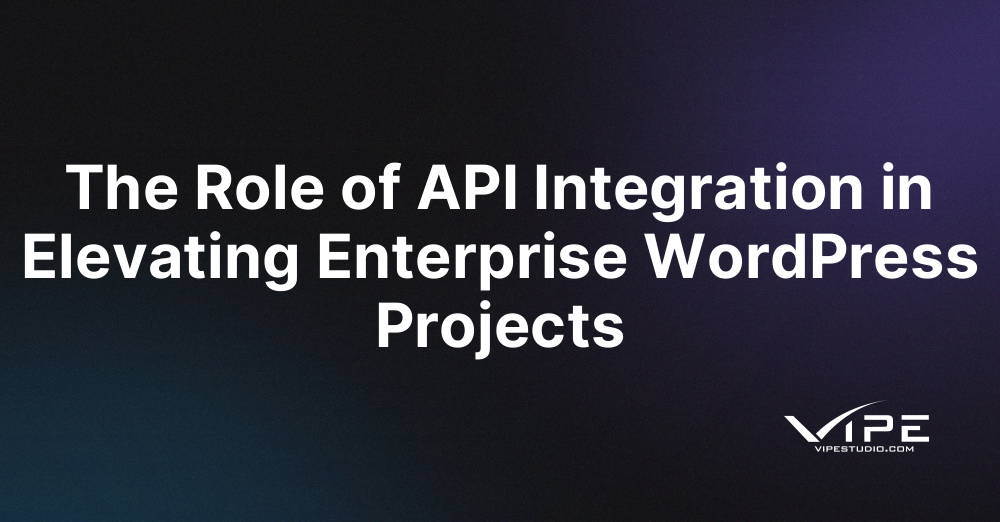16.12.2024
WordPress Development
The Role of API Integration in Elevating Enterprise WordPress Projects
READING TIME: MIN
Table of Content
In the modern digital landscape, enterprises rely on interconnected systems to streamline workflows, enhance customer experiences, and scale operations. At the heart of these systems lies API integration—a powerful tool that bridges the gap between WordPress and various external platforms. This article explores the critical role of API integration in enterprise WordPress projects, its benefits, use cases, and why it’s indispensable for large-scale digital initiatives.
What Is API Integration and How Does It Work?
API (Application Programming Interface) integration enables WordPress to communicate with other applications, systems, or services seamlessly. APIs act as intermediaries, allowing data to be exchanged and actions to be triggered across platforms.
Here’s how API integration typically works:
- Request: A WordPress website sends a request to an external service via the API.
- Processing: The API processes the request and interacts with the external platform.
- Response: The external service sends the required data or feedback back to WordPress.
This seamless interaction ensures that WordPress can function as a dynamic hub, centralizing and leveraging data from various sources.
Why Enterprises Need API Integration in WordPress
API integration transforms WordPress from a standalone CMS into a versatile enterprise tool. Here’s why it’s essential:
- Enhanced Functionality: APIs enable WordPress to extend its capabilities by integrating with CRM tools, payment gateways, analytics platforms, and more.
- Data Synchronization: Enterprises can synchronize data between WordPress and other systems, ensuring consistency and reducing manual effort.
- Omnichannel Experiences: APIs allow content managed in WordPress to be distributed across various platforms, such as mobile apps and IoT devices.
- Custom Workflows: Enterprises can build custom workflows by automating processes through API connections.
These benefits make API integration a cornerstone of enterprise WordPress development.
Key Use Cases for API Integration in WordPress Projects
API integration opens up a world of possibilities for enterprise WordPress projects. Here are some prominent use cases:
- CRM Integration: Connect WordPress with tools like Salesforce or HubSpot to manage leads, track user behavior, and streamline customer engagement.
- E-Commerce Expansion: Integrate with platforms like Shopify or WooCommerce to enhance e-commerce functionalities.
- Third-Party Authentication: Use APIs to enable secure login options through social platforms or enterprise identity management systems.
- Marketing Automation: Sync with tools like Mailchimp or Marketo to manage email campaigns and analyze user data.
- Data Analytics: Integrate with Google Analytics or BI tools for real-time insights into website performance and user behavior.
These examples demonstrate how API integration can meet diverse enterprise needs while optimizing operations.
Challenges in Implementing API Integration
While API integration offers significant advantages, it also comes with its challenges:
- Technical Complexity: Implementing APIs often requires advanced coding skills and a thorough understanding of both WordPress and the external platform.
- Compatibility Issues: Not all APIs are designed to integrate seamlessly, leading to potential conflicts or performance issues.
- Security Concerns: Poorly implemented APIs can create vulnerabilities, exposing sensitive data to unauthorized access.
- Maintenance Overhead: APIs may require frequent updates and monitoring to ensure they function properly as external platforms evolve.
Partnering with an experienced WordPress development team can help mitigate these challenges and ensure seamless integration.
Technologies Powering API Integration in WordPress
Several technologies facilitate effective API integration in WordPress projects:
- REST API: The WordPress REST API allows developers to create, read, update, and delete data programmatically.
- GraphQL: A modern alternative to REST, GraphQL enables efficient data querying and fetching.
- Custom API Development: Enterprises can create custom APIs tailored to their specific workflows and requirements.
- Middleware Solutions: Tools like Zapier or Make act as intermediaries, simplifying API integration between platforms.
These technologies empower WordPress to serve as a dynamic and flexible enterprise platform.
Vipe Studio: Your Partner for Enterprise WordPress API Integration
At Vipe Studio, we specialize in building and integrating APIs that elevate your WordPress projects. Whether you need to connect your website with a CRM, optimize e-commerce functionalities, or create a custom workflow, our team ensures seamless and secure API implementation tailored to your enterprise’s needs.
Ready to take your WordPress project to the next level? Contact Vipe Studio today to learn how we can enhance your enterprise operations with robust API integration.
Conclusion: Unlocking the Full Potential of WordPress with API Integration
API integration is a game-changer for enterprise WordPress projects. By connecting WordPress with external systems, enterprises can enhance functionality, streamline operations, and create more engaging user experiences. Despite the challenges, the rewards of a well-executed API integration strategy are immense, making it an essential component of modern enterprise web development.
More on The Topic
- The Dark Side of WordPress Plugins: A Provocative Exploration
- The Human Cost of Poor WordPress Architecture
- Governance, Ownership, and Responsibility in WordPress Projects
- Product Thinking in WordPress Development
- WordPress Architecture Decisions and Their Business Impact
The content of this website is copyrighted and protected by Creative Commons 4.0.



